Decarbonised Fuel Market Research, 2032
The global decarbonised fuel market size was valued at $8.4 billion in 2022, and decarbonised fuel industry is projected to reach $24.2 billion by 2032, growing at a CAGR of 11.2% from 2023 to 2032.
Report Key Highlighters:
- The decarbonised fuel market has been analyzed in value. The value of the decarbonised fuel market is analyzed in millions of USD.
- This report also provides a detailed impact analysis related to various government policies toward the decarbonised fuel market in the key regulation analysis chapter.
- This report also provides an impact analysis of the Russia and Ukraine war, and U.S. bank's bankruptcy and inflation.
- Global decarbonised fuel market is fragmented in nature with many players such as L'Air Liquide S.A., Plug Power Inc., Shell plc, Neste Oyj, Total Energies SE, Iberdrola S.A., Siemens Energy, BP plc., Linde plc, and ExxonMobil Corporation. Also tracked key strategies such as product launches, acquisitions, mergers, expansion, etc. of various manufacturers of decarbonised fuels.
- Conducted primary interviews with raw material suppliers, wholesalers, suppliers, and manufacturers of the decarbonised fuel market to understand the market trends, growth factors, pricing, and key players’ competitive strategies.
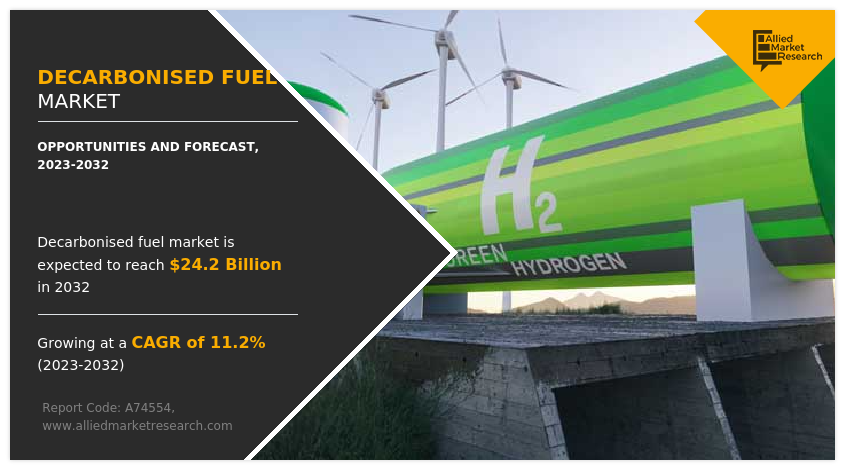
Decarbonized fuels, also known as low-carbon or zero-carbon fuels, are produced from renewable sources such as biomass, hydrogen, and captured carbon dioxide. They are designed to have minimal or zero net carbon emissions when used, as compared to conventional fossil fuels that release substantial amounts of carbon dioxide and other greenhouse gases when burned. These fuels offer a way to drastically reduce carbon emissions in sectors such as transportation, aviation, and heavy industry, where electrification or other renewable energy solutions may not be feasible or practical.
The global decarbonised fuel market growth is driven by the increase in demand for sustainable fuels, surge in awareness regarding the environment, and developments in government policies and incentives. Furthermore, sustainable fuels have shown significant potential in transportation and power generation due to low carbon emission. In addition, the increase in investment toward the development of various new technologies has led to improvement of productivity of decarbonized fuels such as biofuels, which has a significant impact on the market growth.
However, the market growth may be restrained by factors such as high manufacturing costs, and the lack of standardization. In addition, the development of infrastructure, smart cities, and means of transport presents significant opportunities for the decarbonised fuel market. The demand for decarbonised fuels, such as renewable hydrogen and bioenergy, is expected to increase as countries and cities strive to reduce their carbon emissions and transition towards more sustainable energy solutions.
"The Future of Energy: Exploring the Booming Decarbonized Fuel Market"
The decarbonized fuel market is experiencing growth and shaping the energy landscape of the future owing to the potential of the fuel to significantly reduce greenhouse gas emissions and replace fossil fuels in various applications.
One of the key drivers behind the growth of the decarbonized fuel market is the increase in awareness and commitment to combat climate change. Governments, businesses, and consumers alike are recognizing the urgent need to reduce carbon emissions.. Many countries and regions have set ambitious targets to achieve net zero emissions by mid-century, and decarbonized fuels are seen as a critical solution to achieve these goals. In addition, advancements in technology and innovation have made the production of decarbonized fuels more efficient and cost-effective, further propelling the market growth.
The decarbonized fuel market is witnessing significant investment and innovation across the value chain. Various stakeholders are actively contributing to the development and deployment of decarbonized fuels. For instance, renewable hydrogen produced through the electrolysis of water using renewable electricity is gaining traction as a promising decarbonized fuel. Renewable natural gas, which is produced from organic waste and agricultural residues, is also emerging as a viable option to replace fossil natural gas in heating and transportation.
Furthermore, the aviation industry is exploring the use of synthetic jet fuels produced from renewable sources, such as biomass or captured carbon dioxide, to reduce its carbon footprint. These fuels can be blended with conventional jet fuel or used as drop-in replacements in existing aircraft without any modifications to engines or infrastructure, making them a promising solution for decarbonizing aviation.
There are many challenges despite the significant progress and potential of the decarbonized fuel market. One of the key challenges is the increase in production to meet the rise in demand for decarbonized fuels. The production of decarbonized fuels often requires large amounts of renewable energy, which can pose logistical and economic challenges. In addition, the regulatory and policy landscape around decarbonized fuels is still evolving, with differing standards and incentives in different regions, which can impact the market growth and investment decisions. Thus, the decarbonized fuel market is experiencing rapid growth and is expected to play a crucial role in the transition to a sustainable energy future.
The decarbonised fuel market forecast is segmented into type, form, end-use, and region. By type, the market is divided into organic-based, green hydrogen and derivatives, and others. By form, it is bifurcated into liquid and gaseous. By end-use, it is segregated into transportation, power generation, and others. By region, the market is segmented into North America, Europe, Asia-Pacific, and LAMEA.
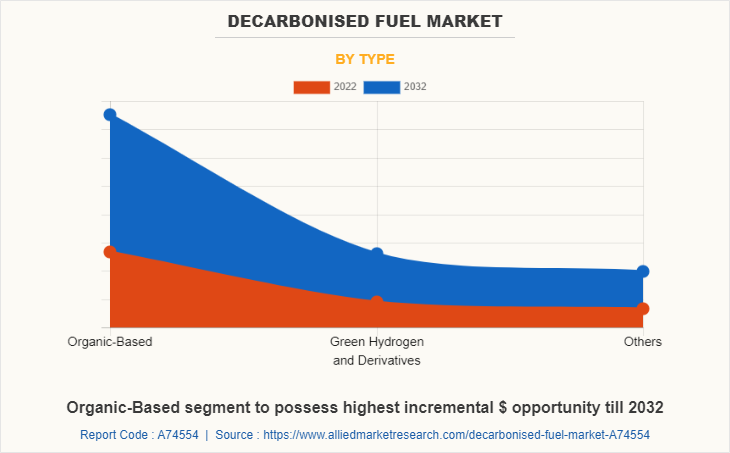
Based on type, organic-based segment is expected to dominate the decarbonized fuel market share till 2032. The market for organic-based decarbonised fuels is experiencing significant growth as countries and regions worldwide prioritize renewable energy to reduce carbon emissions and combat climate change. The demand for organic-based decarbonised fuels is driven by various factors, including increase in demand for renewable energy, supportive policy and regulatory environment, technological advancements, diversification of feedstock sources, rise in interest in sustainable aviation fuels, and business and investment opportunities across the value chain.
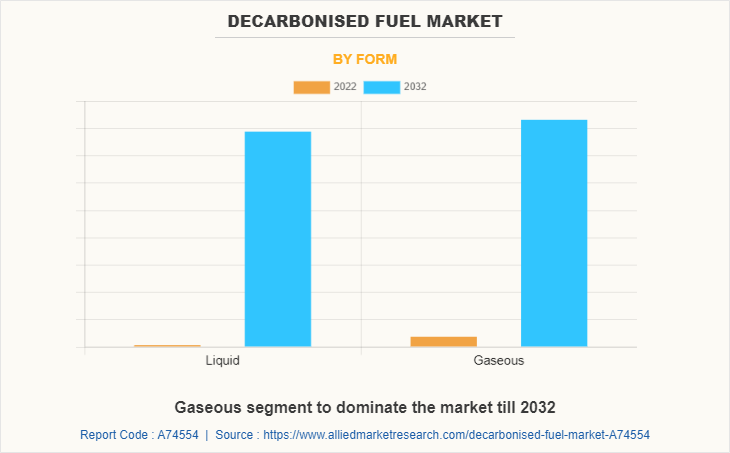
Based on form, gaseous segment is expected to dominate the decarbonized fuel market till 2032. The market for gaseous decarbonised fuels is witnessing several key trends, growth factors, and opportunities that are driving its development. One major trend is the increase in global focus on mitigating climate change by reducing greenhouse gas emissions, which has led to a growing demand for low-carbon and renewable energy solutions.
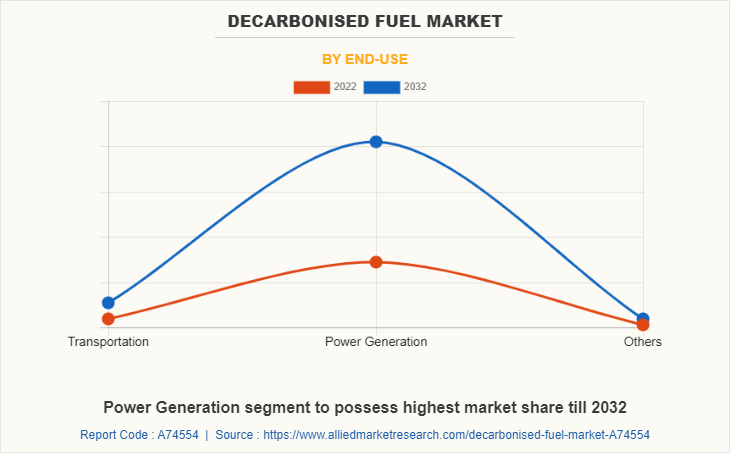
Based on end-use, power generation segment is expected to dominate the decarbonized fuel market till 2032. The market for decarbonized fuels in power generation end-use industries is experiencing significant growth, driven by several key market trends, growth factors, and opportunities. One major trend is the increasing global focus on reducing greenhouse gas emissions and transitioning to a low-carbon economy to mitigate climate change. This is leading to greater demand for decarbonized fuels, such as renewable electricity, hydrogen, and bioenergy, as they offer cleaner and more sustainable alternatives to fossil fuels.
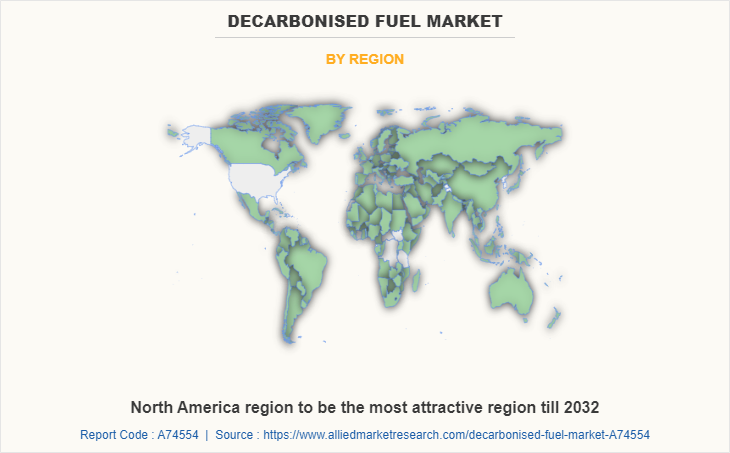
Based on region, North America is expected to dominate the decarbonized fuel market till 2032. North America is witnessing key market trends and opportunities related to decarbonised fuels as the region aims to reduce greenhouse gas emissions and transition to a more sustainable energy system. One major trend is the growing adoption of renewable hydrogen as a decarbonised fuel. Several states in the U.S., such as California and Texas, are investing in renewable hydrogen production using their abundant renewable energy resources and existing hydrogen infrastructure.
Impact of Russia and Ukraine War on Global Decarbonised Fuel Market
- The ongoing conflict between Russia and Ukraine has had significant impacts on the decarbonised fuel market. The region's geopolitical tensions and military hostilities have resulted in heightened uncertainty, increased risk perception, and disrupted supply chains, which have all affected the market for decarbonised fuels.
- One of the major impacts of the Russia-Ukraine conflict on the decarbonised fuels market is the disruption of the natural gas supply, as Ukraine serves as a key transit route for Russian gas to Europe. This has raised concerns about the reliability and security of the natural gas supply, which has implications for the transition to decarbonised fuels.
- The conflict has also affected the region's investment and financing for decarbonised fuel projects. Heightened geopolitical tensions have created uncertainty for investors, leading to a decrease in investment in decarbonization initiatives in Russia and Ukraine.
- Businesses and governments may be hesitant to commit to long-term investments in decarbonised fuel projects due to the geopolitical risks and uncertainties associated with the conflict.
- In addition, the conflict has highlighted the geopolitical dimension of energy security and the need for diversification of energy sources and supply routes. This could potentially impact the demand for decarbonised fuels as countries seek to reduce their dependence on fossil fuels from regions affected by geopolitical tensions.
Impact of Bankruptcy and Inflation on Global Decarbonised Fuel Market
The impact of inflation or bankruptcy of banks on the decarbonised fuels market can be significant and can have both direct and indirect effects.
- First, inflation can increase the costs of production and operation for decarbonised fuel projects. As the prices of raw materials, labor, and other inputs rise due to inflation, the cost of producing decarbonised fuels may also increase, potentially impacting the competitiveness and viability of these projects. Inflation can also affect the pricing of decarbonised fuels, as higher production costs may result in higher prices for consumers, which could impact demand and consumption.
- Indirectly, inflation or bank bankruptcies can impact investor sentiment and confidence in the decarbonised fuel market. Uncertainty and instability in the broader economic environment may lead to a cautious approach from investors, potentially reducing investments in decarbonised fuel projects or delaying new initiatives.
Competitive Landscape
Key players in the decarbonised fuel industry include L'Air Liquide S.A., Plug Power Inc., Shell plc, Neste oyj, Total Energies SE, Iberdrola S.A., Siemens Energy, BP plc., Linde plc, and ExxonMobil Corporation. These players have adopted investment strategies in research and development to commercialize decarbonised fuels in the market.
Key Benefits For Stakeholders
- This report provides a quantitative analysis of the market segments, current trends, estimations, and dynamics of the decarbonised fuel market analysis from 2022 to 2032 to identify the prevailing decarbonised fuel market opportunities.
- The market research is offered along with information related to key drivers, restraints, and opportunities.
- Porter's five forces analysis highlights the potency of buyers and suppliers to enable stakeholders make profit-oriented business decisions and strengthen their supplier-buyer network.
- In-depth analysis of the decarbonised fuel market segmentation assists to determine the prevailing market opportunities.
- Major countries in each region are mapped according to their revenue contribution to the global market.
- Market player positioning facilitates benchmarking and provides a clear understanding of the present position of the market players.
- The report includes the analysis of the regional as well as global decarbonised fuel market trends, key players, market segments, application areas, and market growth strategies.
Decarbonised Fuel Market Report Highlights
| Aspects | Details |
| Market Size By 2032 | USD 24.2 billion |
| Growth Rate | CAGR of 11.2% |
| Forecast period | 2022 - 2032 |
| Report Pages | 315 |
| By Form |
|
| By End-Use |
|
| By Type |
|
| By Region |
|
| Key Market Players | Neste Oyj, Linde plc, Iberdrola S.A., Siemens Energy, L'Air Liquide S.A., TotalEnergies SE, Plug Power Inc., Exxon Mobil Corporation, BP p.l.c., Shell Plc. |
Analyst Review
According to CXOs of leading companies, the decarbonized fuel market is anticipated to witness notable growth during the forecast period driven by a surge in focus on reducing carbon emissions and transitioning towards sustainable energy. The decarbonized fuel market is witnessing growth due to increase in the awareness and urgency to combat climate change rise in in demand for low-carbon fuels in the emerging economies of Brazil, India, and China and surge in the use of hydrogen and biofuel in major end-use industries such as transportation, aviation, and power generation.
Although LAMEA has emerged as a lucrative region for investors, Europe is perceived as a mature market for decarbonized fuels due to the decline in the oil & trade activities between Russia due to the Russia-Ukraine war. An increase in demand for sustainable fuels from developing nations such as the UAE, India, and China, is expected to drive the growth of the market during the forecast period.
Surge in demand for sustainable and low-carbon energy solutions and government policies and incentives are the key factors boosting the Decarbonised fuel market growth.
Power generation application is projected to increase the demand for Decarbonised fuel Market
L'Air Liquide S.A., Plug Power Inc., Shell plc, Neste oyj, Total Energies SE, Iberdrola S.A., Siemens Energy, BP plc., Linde plc, and ExxonMobil Corporation.
The market value of Decarbonised fuel in 2032 is expected to be $24.2 billion
The decarbonised fuel market is segmented into type, form, end-use, and region. By type, the market is divided into organic-based, green hydrogen and derivatives, and others. By form, it is bifurcated into liquid and gaseous. By end-use, it is segregated into transportation, power generation, and others. By region, the market is segmented into North America, Europe, Asia-Pacific, and LAMEA.
Development of infrastructure, smart cities, and means of transport is the Main Driver of Decarbonised fuel Market.
Loading Table Of Content...
Loading Research Methodology...



